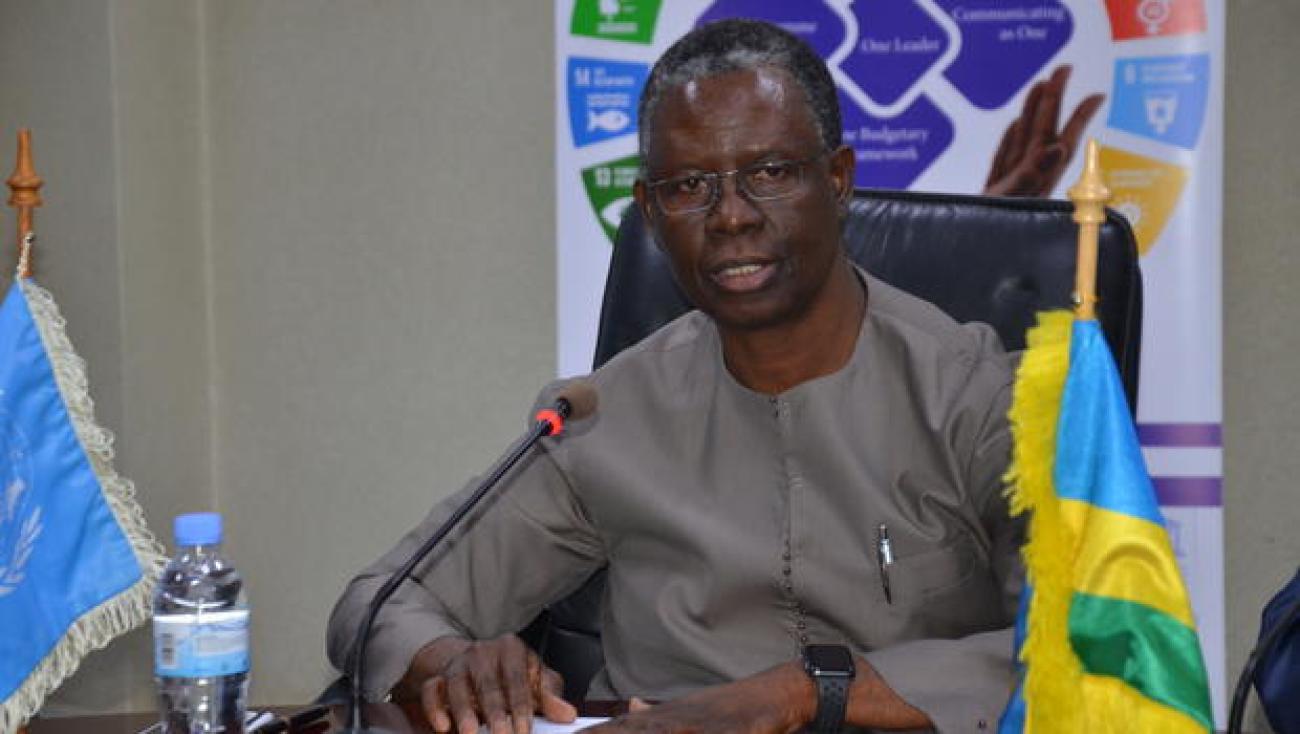Kigali, July 31, 2018 | Statement by the United Nations Resident Coordinator Mr. Fodé Ndiaye on the occasion to mark the official signing of the second United Nations Development Assistance Plan 2018-2023.
Nyakubahwa Minister,
Representatives of the national stakeholders,
Ambassadors, representatives of the diplomatic corps, missions and development partners,
Colleagues from the One UN Family,
Representatives of the media,
It is with great pleasure that on behalf of One UN Rwanda, I have just signed with the Hon. Minister MINECOFIN our United Nations Development Assistance Plan (UNDAP II) 2018-2023 for an indicative budget of 630 million USD. The UNDAP II has been designed through an inclusive and participatory process and is aligned with the National Strategy for Transformation (NST1), the Government 7-Year Plan 2017-2024, as already stated by the Hon. Minister.
In my introduction, allow me to look back to our achievements.
Over the last five years, One United Nations Rwanda has contributed to the remarkable socio-economic progress of this country, bringing tremendous benefits to its population.
One UN Rwanda extends its sincere thanks to the Government of Rwanda, for its clear vision, its strong leadership, and its trusted cooperation; to the other national stakeholders and development actors for their valuable partnership; and to all the donors for their financial support at country, regional and global level.
It is very clear that what we have achieved is a combination of all this partnership and support. It is important to highlight that the UN is not a donor, but a development partner. What we bring includes our catalytic finance, our technical expertise, our experience and knowledge sharing, the facilitation of south-south cooperation, our work on norms and standards, and our advocacy. Of course, we also support policies and strategies that are people-centered, we help to generate & analyze data, and develop research systems to inform priority policy and programme options; and we help to build resilient institutions that can deliver services to people. We have been in Rwanda for more than 40 years, and we can see that all our joint efforts have made a clear difference in improving people’s lives.
As demonstrated by our various reports, our positive action includes enhancing access to qualitative and quantitative service delivery in education, in health – including reproductive health and HIV AIDS –, and in fighting against stunting and promoting early childhood development. It involves developing more economic opportunities and ensuring access to finance for wealth and job creation mainly for youth and women, in various areas both off-farm and in agriculture. Our work has helped to enhance human rights, gender equality and women’s & young people’s empowerment. Our programmes contributed also to deepening democracy, accountable governance and access to justice, and to protecting the environment. Our operations served also to provide humanitarian support to refugees, returnees and host communities and managing disaster risks.
Overall, our partnership has been useful in reducing poverty, tackling vulnerabilities and in building a more cohesive and inclusive society.
At this juncture, let me pay tribute to my predecessor and the collective leadership of the former and current UN Country Team members and more importantly to the commitment and tireless work of our staff. We are very proud of the UN staff in Rwanda, for their remarkable and globally acknowledged contribution, both in programme effectiveness and in operations efficiency. The Government’s great leadership and our collective efforts have positioned Rwanda as a leading country in the world in Delivering as One, UN acting in a coordinated manner.
This has been a remarkable journey that led to achieving almost all of the targets of the Millennium Development Goals (MDGs) and positioning Rwanda to embark on the next 15-year journey within the framework of the Sustainable Development Goals.
Building on those recognized achievements, we are truly confident that with our new United Nations Development Assistance Plan 2018 – 2023, anchored on the National Strategy for Transformation (NST1 2017-2024), linked to the Agenda 2030 and the African Union Agenda 2063 and the East African Community Vision 2050, we will do more and better for the populations in Rwanda, mainly the most vulnerable ones, leaving no one behind. You can count on One UN Rwanda to do its part, we are sure that we can count on you for enhanced cooperation.
Our UNDAP has six outcomes, 2 per pillar. There aligned with the NST1 three pillars ((i) economic transformation; (ii) social transformation and (iii) transformational governance). It also is grounded on a gender strategy and a Human Rights strategy. It also considers the following approaches and focus: (1) data; (2) institution; (3) theme; (4) geographic area. The UNDAP is also supported by a strong Business Operations Strategy (BOS 2).
The distribution of the budget among the three areas of cooperation is as follows: economic transformation: 142,874,919 USD, thus 22.6%; social transformation: 432,155,134 USD, thus 68.6% and transformational governance: 55,661,074 USD, thus 8.8%.
The total budget of our UNDAP II over the next five years is 630,691,127 USD. 40% of the budget, 252,655,776 USD is available and 60%, 378,035,351 has to be mobilized.
The budget includes humanitarian 272,79,908 USD, thus 43.2% and development 357,900,219 USD thus 56.8%.
We therefore have a good document and a clear roadmap. We need more resources to implement. At global level, UN reforms approved by all member states is calling for more pooled funds. The SDG Fund presented during the ONE UN Steering Committee is a good vehicle. So, we know that we can generate enhanced partnership and resource mobilization.
With the strong leadership of the government, our enhanced trusted partnership with national stakeholders and development partners in this country, the financial support of our donors, the future is bright. This is our aim, our desire and our joint commitment!
Turi Kumwe, abishyize hamwe nta kibananira!



















